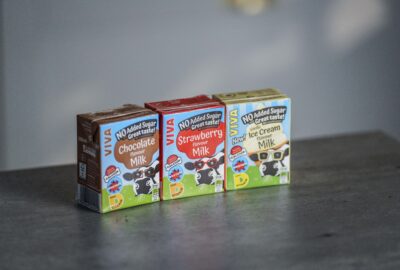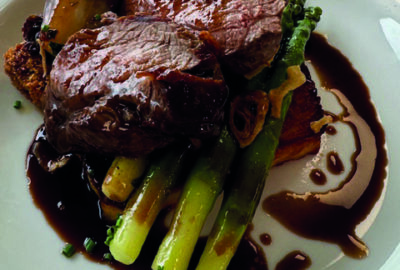For those who have doubts about their career and are hesitant about making a change, chef Elizabeth Haigh’s meteoric rise proves that it can pay to be brave. Four years into an architect course at the age of 21, Elizabeth ditched it in for a career in the kitchen. Ten years later, Elizabeth is now one of London’s most talked about chefs with her Mei Mei restaurant in Borough Market launching in 2019, appearances on Saturday Kitchen following, and her first recipe book – Makan – out in May. We spoke to Elizabeth ahead of the big hospitality reopening.
Where does your love of food come from?
I was born in Singapore and moved to the UK when I was a baby so it’s really my mother’s Singaporean heritage that is central to my love of food. Food and cooking are ingrained in the blood of all Singaporeans so my mother would cook fresh South East Asian food six nights a week for us as kids in Maidenhead. With holidays often spent back in Singapore with our big family, food was central to everything and I was always trying new ingredients, dishes and flavours.
How did your career in food begin?
I can’t remember it ever being an option for me to start a career in food. It was all about getting exams, qualifications and going to university. While studying architecture at university, I just realised there was something missing. It wasn’t that I didn’t like my course or the subject but my fire just wasn’t burning. I was spending pretty much all of my student loan and all of my time in my university flat kitchen so when a friend dared me to enter MasterChef, I jumped at it and thankfully it went well.
How was it making the shift from MasterChef to a professional kitchen?
Following MasterChef, I realised I had found my passion but I didn’t really know much about getting into the industry. I started to write letters to a selection of top restaurants and chefs but I didn’t realise how easy it was to get started. I was literally working within a week and getting my first real taste of the gruelling hours, the work and the life in a professional kitchen. I started at the bottom, working five days a week learning the basics, with my two days off spent at Westminster Kingsway where I was getting my qualifications. I did this for about three years which was a lot of hard graft but it was extremely rewarding.
What was next?
After receiving my qualifications, I concentrated on building up my experience with long periods working at Bubbledogs, The Kitchen Table and eventually for Neil Rankin at the Smokehouse. It was here that I really learnt the importance of building my profile as a chef, running events and pop ups, and it obviously worked as I was soon poached to be head chef at Pidgin in Hackney. This was completely different to anything I had done and while the role gave me so much more creative freedom and control, it was also extremely challenging. Winning the Michelin star in 2016 made it all worthwhile though and it was during this time that I learnt a lot about what sort of chef I wanted to become and was glad I made the decision to move on.
Tell us about Mei Mei?
The idea really came about when my husband asked me where you could buy some good Hainanese Chicken Rice and I struggled to give him an answer. Thinking about it more, I realised that the Singaporean food I was brought up on was very under-represented in London. The food halls and hawker culture in Singapore dominates with a real community feel and this is what we wanted to recreate. The menu is very personal showcasing my mother and wider family’s recipes and heritage.
What have you learnt in the past year?
We opened in November 2019 in Borough Market so it’s not been the year we envisaged to say the least. No one puts in their business plan details on what they would do if a pandemic hit. While in bigger restaurants, there is a team to deal with everything, we quickly found that it was all on us and the only way to keep going was to get our hands dirty, work hard and be innovative. It’s incredible that prior to launch I was a Michelin-starred chef and I was confident I could run any restaurant. Now, I am a chef, accountant, online retailer, product and website developer, marketeer, e-commerce expert and lots more. My Linked In profile is going to look unbelievable when I get a chance to update it!
Your first cook book called Makan launches in May. What can we expect?
Makan is a collection of Singaporean-inspired recipes that would form the basis of family meals. Inspired by the traditions and recipes my mother taught us as kids, it’s not fine dining but more vibrant, everyday recipes that are accessible to everyone. For those who haven’t tried Singaporean cuisine before, it’s a fantastic way to begin your journey.
What are your three kitchen secrets?
1. Prepare as much as you can. Whenever I do a meal, I prepare as much as I can first, chopping, slicing, measuring out anything, then start cooking. Saves you rummaging around or realising halfway you don’t have milk etc.
2. Buy a good thermometer – I use a Thermapen, a quick, accurate thermometer for checking whether meat/fish/dishes are ready to eat. After a while you get used to how long it takes to cook something but I still use my thermometer as I’m constantly checking and changing dishes.
3. Use sharp, good knives and good ingredients. I always support independent shops/businesses for my ingredients because I know that the meat/fish has come from a good place.
What is your favourite ingredient and why?
Salt. Because it transforms any ingredient into something more special.
Please could you share your favourite recipe, along with your reasons for choosing it?
Of course, this recipe is Aubergine and Pork Mince Stir-fry, which is from my book Makan. It’s super quick, easy and adaptable for the family. As a typical toddler, I struggle to get Riley to eat a lot of vegetables but the pork hides it for him, and so I adapt this recipe to have less or more chilli if I’m cooking for him.
This recipe makes a quick and easy dinner. The key is to cook the aubergine properly, making sure it is softened before adding the sauce. If you need to increase the cooking time for the aubergine, add more water to the wok to help it ‘flash-steam’ through.



